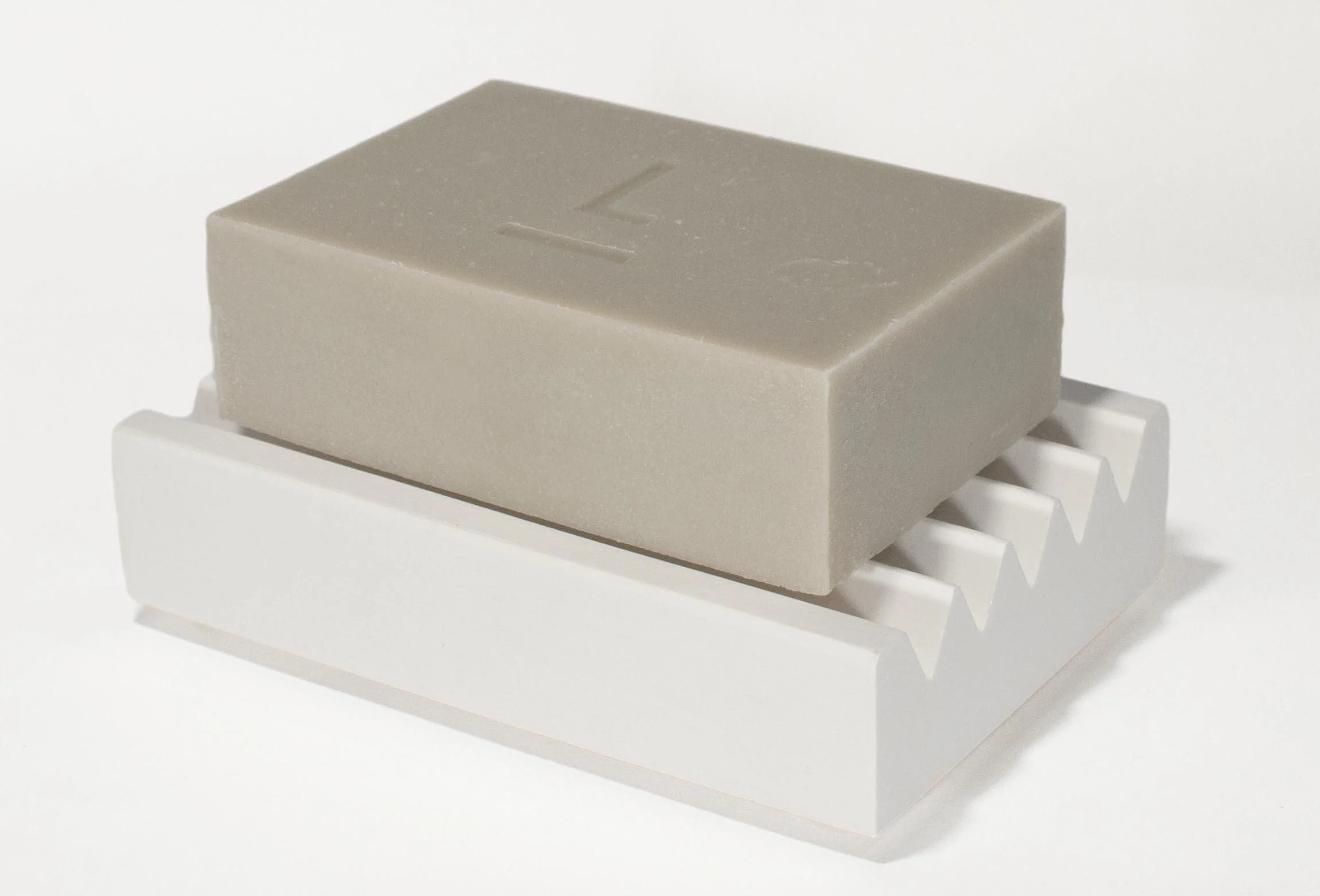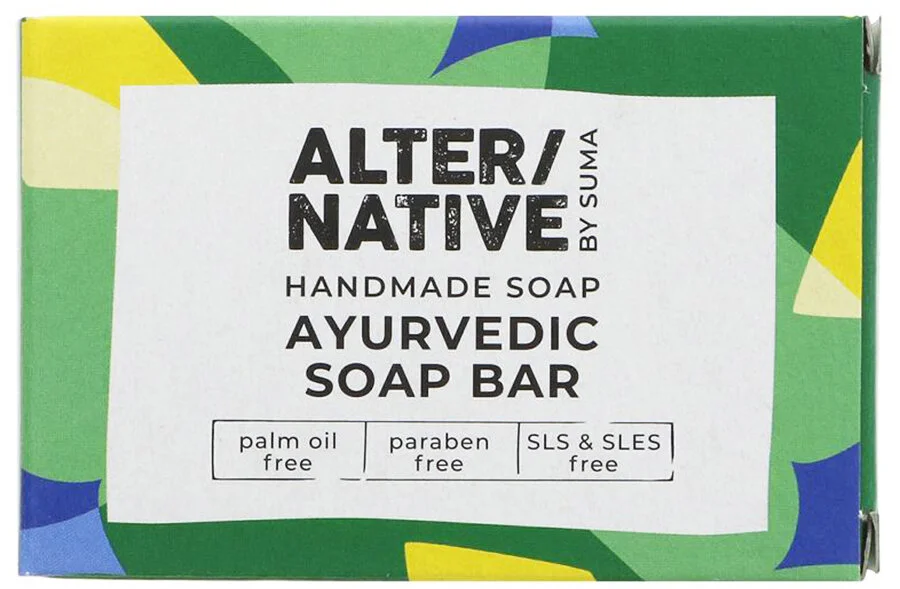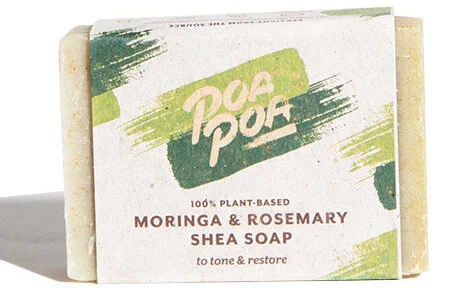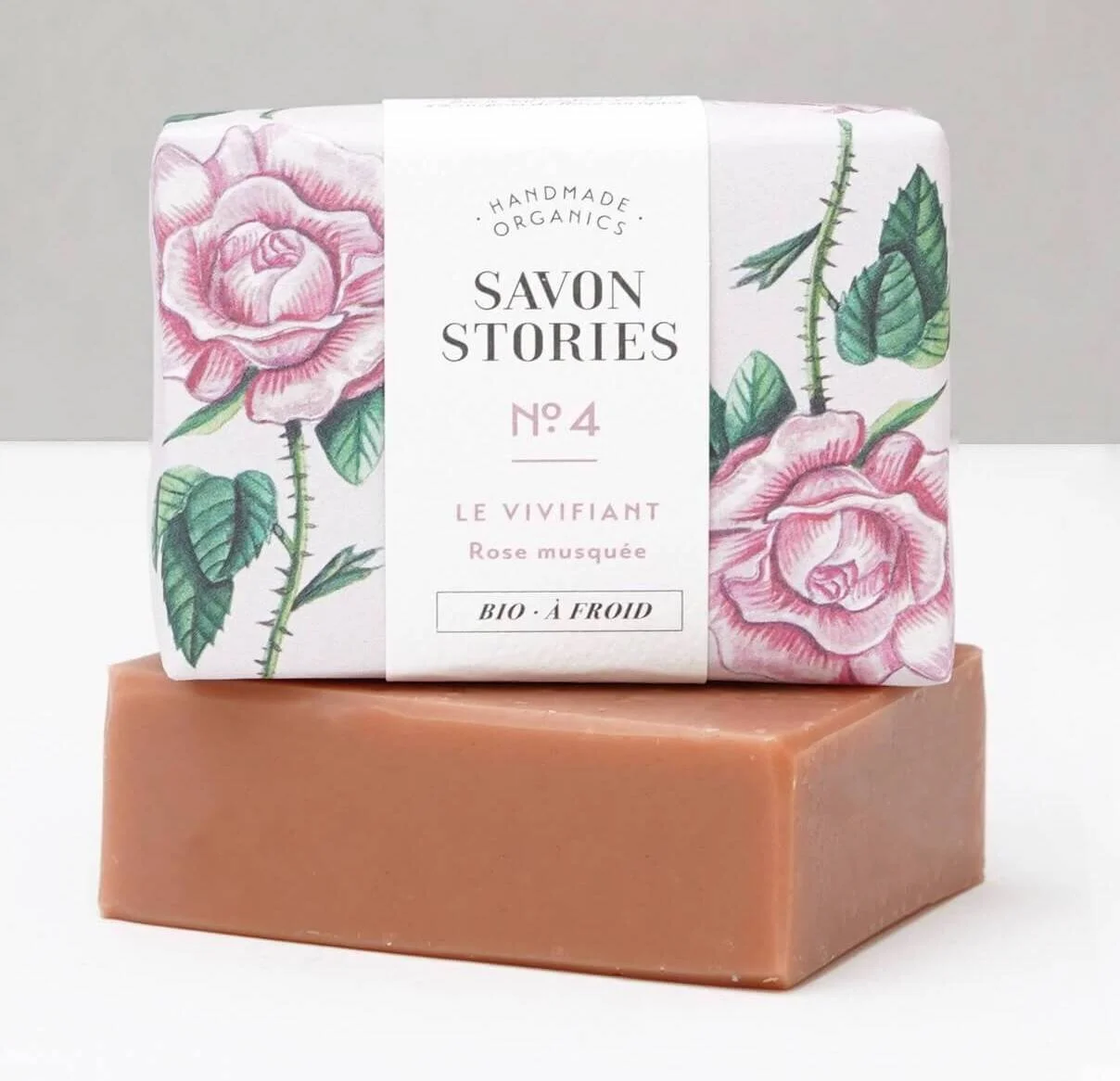SOAP-ERIOR SOAP
Historically heralded as not only an effective cleanser but as a beneficial treatment for skin conditions, a bar of soap may well be the very first beauty product that most of us encounter in our lives. To some, with the plethora of hand soap pumps and showers gels on the market, it can seem old-fashioned, and for others whose grannies swore by Imperial Leather, it’s nostalgic. The humble bar of soap however is making its comeback — this bathroom basic may be a hark back to simpler times, but when it comes to being eco it’s one of the easiest swaps we can make.
In comparison to the aforementioned shower gels and liquid hand soaps and most other beauty and cleaning products, the packaging for a bar of soap is minimal. In fact, depending on where you are buying it and how you’re transporting, you don’t really need any! According to Green Matters, bar soap is generally considered the most sustainable washing option, with 10 times less of an environmental impact than its liquid equivalent. Aside from using 30% less water than liquid soap, and having a greener manufacturing process, the packaging is generally made of cardboard or paper which is easy to recycle, plus you can even use it to gift wrap a small present if you want to give it another life first!
So in terms of carbon footprint and packaging soap is the way to go, but how about what it’s made from? The first soap was made from the chemical reaction between lard and wood ash — a revelation when it came to washing clothes. In fact the name “soap” comes from the legend of how it was first discovered in Mount Sapo, ancient Rome. Those same simple ingredients are required to make bar soap today — a base of fat is saponified (saponified literally means “turned into soap”) in a chemical reaction with an alkali salt collectively referred to as lye (mostly sodium hydroxide but can also be potash or potassium carbonate from the ashes of plant materials). The lye, being extremely alkali, is highly caustic and hazardous to work with but once the chemical reaction (saponification) between the fat and salt has taken place the soap that results is completely safe and now has the ability to lift dirt (when used with a bit of water and agitation) so that water can wash it away. As a side note, most liquid hand wash soaps are actually made from chemically synthesised detergents rather than being fat or oil-based.
These days natural, organic and plant-based soaps are shooting straight back into the mainstream as we become more aware of the environmental impacts of the products we’re using and what we are using on our skin. The basic ingredients you are looking for in a soap bar are a fat, e.g. coconut or olive oil and, and if you like, a scent, e.g. an essential oil or herb which can add therapeutic benefits, such as rose for skin softening and lavender for its calming properties. Remember to read the label and not just the fancy marketing on the packet. While many soaps will contain sodium in some form (for the alkali salt reaction) I steer clear of SLS (sodium lauryl sulphate — usually used to help a product foam), parabens (the most commonly used in beauty are methylparaben, propylparaben, and butylparaben) and dimethicone, a silicone popular in skincare for that “silky feel” but which is controversial when it comes to whether or not it is good for your skin and health. Also be aware of soap bars that contain palm oil or at least palm oil that isn’t sustainable, as well as soaps that are not designed for skin at all (such as laundry cleaning soap) as these can be caustic. I would exercise caution with the overuse of strong antibacterial soaps, which can be, at the very least, drying for your skin and possibly lead to skin irritation and contribute to the degradation of the protective skin barrier.
While you might not want to attempt making soap from scratch (saponification as you might have guessed is not a walk in the park!!), you can still make your own soap with minimal equipment by buying a ready made soap base (such as pure soap flakes from saponified plant oils) to make a “melt and pour” style soap, which can be customised to suit your needs. While I’ve not tried soap-making I do use these flakes, which I bulk buy, as a hypoallergenic and fragrance-free option ideal for washing the baby’s clothes, as well as gentle enough to clean waterproof coats, sports equipment, shoes and swimwear to prevent deterioration to the elastic and the waterproof coatings.
To make a bar of soap last longer (natural and homemade soap bars are more delicate), take care of it between washes. Give it a rinse and place it on a soap holder with adequate drainage holes to avoid the soap sitting in water and disintegrating — I recently discovered “Soap Lifts,” a porous eco soap sponge to help your soap breathe, dry quickly and stop bacteria forming. Read on for some of my favourite soap bar brands to shop:
LEGRA is a family-owned company located in the vibrant town of Leigh on Sea, creating all natural soap and deodorant. LEGRA started as a way to create a more sustainable lifestyle without the compromising of effectiveness. The brand’s soaps and other products are free of aluminium, propylene glycol, SLS, PEG, parabens, phthalates, artificial fragrance and colourants whilst the non-plastic packaging is biodegradable.
Grüum is built on Scandinavian ideals — the brand only creates products that serve a real purpose, using only quality ingredients. Plastic and palm oil-free, Grüum’s soap is 100% natural, cruelty-free, vegan and made in the UK.
ALTER/NATIVE by Suma is a handmade completely vegan, cruelty-free range of products, made with pure essential oils and free from parabens, SLS and plastics. Harnessing the power of plants, ALTER/NATIVE create products that are not only great for your skin and hair but also our planet. Everything is made in the UK, produced by local small craft makers wherever possible. Suma is a worker co-op. They don’t have any bosses or shareholders; they are a business owned and run by the nearly 200 employees who work there who all have an equal say in what they do. They are also the largest equal pay worker co-op in Europe, and all employees get paid the same wage, take responsibility and do a range of jobs each week from warehouse work, to truck driving, to accounts.
Poapoa is on a mission to challenge accepted standards, and take fair trade further using soap as a vehicle to do so. The brand partners with small producers from rural, emerging communities to cultivate botanical blends and introduce them to a market they couldn’t otherwise access. In the past, the farmers and producers Poapoa work with only sold raw ingredients at a low cost (i.e. not coconut oil or shea butter but coconuts and shea nuts). They usually only had one client and were bound to their offer. Poapoa instead work with the farmers to process the raw ingredients where they are farmed, create the product nearby which can be sold for more — a coconut is worth10p for example, whilst a soap bar is worth £3.
AHYOKA Raw African Black Soaps are traditionally made in the Ashanti region of Ghana, West Africa by hand, using the age-old traditional recipe. They are 100% natural, free from artificial ingredients, chemicals, preservatives, colour enhancers, fragrances and parabens; they are suitable for vegans and the plant-based community. Raw African Black Soap is often described as a miracle soap, an all-natural cleansing soap, and a prime example of the beauty of indigenous Ghanaian knowledge. This is due to the abundance of minerals, antioxidants and vitamins it contains. It is a rich and moisturising all-purpose soap that can cleanse and rejuvenate your skin, body and hair, ideal to use on sensitive, oily, dry and problematic skin.
Savon Stories is an organic skincare atelier based in London, England. Born out of a century's family farming heritage, they formulate remedies to cleanse, treat and nourish the skin, using only raw organic and food grade botanical ingredients. Organic, vegan and cruelty-free, palm-free and handmade in England.
Dr Bronner's organic pure-castile soap bars are made with certified fair trade ingredients and organic Hemp Oil. The soaps are 100 percent biodegradable in a 100 percent post-consumer recycled wrapper and formulated for washing your body, face or hair.
Holy Lama Naturals’ luxurious natural handmade soap is made with virgin coconut oil and a unique blend of essential oils. Each soap is beautifully packed in a handmade shell made from the leaf of areca palm tree. These leaves are shed by the tree regularly, and the brand mould them to form a sustainable and eco-friendly packaging.
For more beauty blogs, head to the Beauty with Belief section on my website and check out my recommendations for hand creams and body butters for post-wash moisturising.









